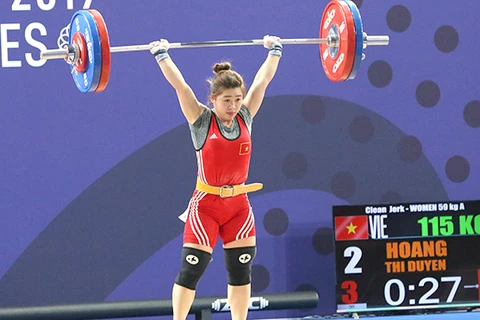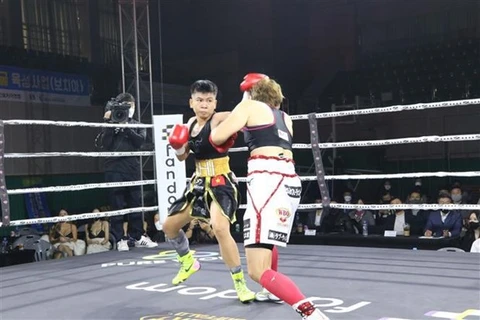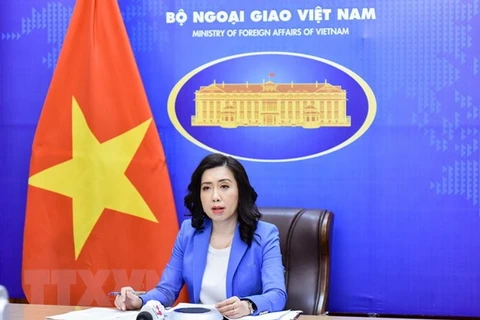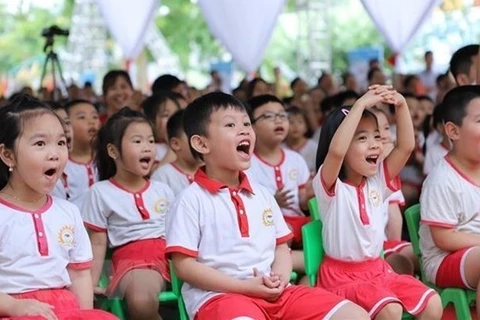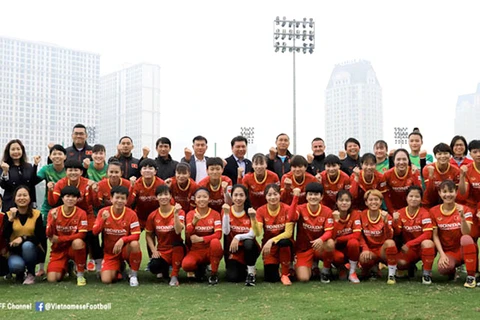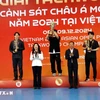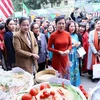 From left: Vietnamese weighlifter Hoang Thi Duyen, boxer Nguyen Thi Thu Nhi and footballer Cu Thi Huynh Nhu in action (Photo: VNA)
From left: Vietnamese weighlifter Hoang Thi Duyen, boxer Nguyen Thi Thu Nhi and footballer Cu Thi Huynh Nhu in action (Photo: VNA) However, more than once, the sportswomen’s career choice has been the target of negative comments regarding their physique, femininity, or marital status, from people who still hold prejudices against women performing in what are considered male-dominated territories.
There are times when some sports are presented as either masculine or feminine, aligning with traditional expectations of men and women, which makes it difficult for women to break through gender barriers and participate in sports deemed “masculine”.
Nguyen Thi Thu Nhi was Vietnam’s first World Boxing Organisation (WBO) champion, after winning a WBO belt in the Republic of Korea on October 23, 2021.
She made history in doing so, and it was a fitting gift after celebrating her 25th birthday a day earlier.
After her arm was raised in victory, Nhi turned to the camera and shouted “I’m from Vietnam!”
At that moment, she wanted everyone watching to know that she is Vietnamese and that Vietnamese boxers are capable of making it to the top.
She has now moved up a place to fourth in the world’s mini-flyweight rankings, according to the latest rankings from boxing’s official record keeper, BoxRec.
Her inspiration is Luu Thi Duyen, who was the first Vietnamese female boxer to win a gold medal at the Southeast Asian Games, in 2013.
“I have had a burning passion to become the first Vietnamese boxer to achieve an international title, and I did that when I became the first WBO champion from Vietnam,” said Nhi, who views herself as tenacious, resolute, and hard-working.
Boxing has received more attention in Vietnam in recent years, following the success of a number of Vietnamese boxers in the international arena, she explained.
“I am truly delighted that I am able to make a modest contribution to its development.”
Her inspiration is Luu Thi Duyen, who was the first Vietnamese female boxer to win a gold medal at the Southeast Asian Games, in 2013.
“I have had a burning passion to become the first Vietnamese boxer to achieve an international title, and I did that when I became the first WBO champion from Vietnam,” said Nhi, who views herself as tenacious, resolute, and hard-working.
Boxing has received more attention in Vietnam in recent years, following the success of a number of Vietnamese boxers in the international arena, she explained.
“I am truly delighted that I am able to make a modest contribution to its development.”
 Nhi trained at the Cocky Buffalo club in HCM City to prepare for her WBO title fight in 2021 (Photo courtesy of Cocky Buffalo)
Nhi trained at the Cocky Buffalo club in HCM City to prepare for her WBO title fight in 2021 (Photo courtesy of Cocky Buffalo) Nhi is persistent and willing to go through the mill to become a professional athlete. Many people, despite their great love for sport and attempt to follow the profession path, have to give up for various reasons.
Her family and friends are all supportive of her career choice and decisions, Nhi said. There are always those, however, that will ask her about marriage or “who would dare take you as a wife” given she is involved in “such a dangerous sport”.
“I don’t feel pressured by such comments,” she said.
And female athletes are always willing to give their best at competitions, even during “that time of the month”.
Hoang Thi Duyen was among 18 athletes representing Vietnam at the 2020 Tokyo Olympic Games, despite a knee injury not fully healing at the time.
When weightlifters suffer injury, they continue to train using the parts of their body that are still in good shape. They then return to full training once they have 70 percent recovered from the injury.
When “that time of the month” comes around, the Olympian said, it takes a toll on her body and her strength. Weightlifting requires strength in the back and abdomen in particular, areas where she feels the most discomfort at that time.
Female weightlifters can take one day off from training if they feel a need, but simply must endure the difficulties during competition, doing their best and hoping their performance is not overly affected.
 Duyen poses for a photo with the Olympic symbol at the 2020 Tokyo Olympic and Paralympic Village (Photo courtesy of the weightlifter)
Duyen poses for a photo with the Olympic symbol at the 2020 Tokyo Olympic and Paralympic Village (Photo courtesy of the weightlifter) Her parents, however, were vehemently against her desire to succeed at the sport, feeling anxious that she may face various hardships and that her body would be overly burdened by the nature of the sport.
At first, Duyen hid her daily training routine from her parents, walking more than 10km each day along mountain paths to reach the training centre. After noting she was coming home later and later and that her skin was becoming tanned, they soon discovered her secret.
She had to seek help from her coaches to convince her parents, and works hard to succeed and prove her determination and talent.
Duyen spends about five hours each day training, starting with lifting a 15kg barbell a few times before gradually adding to the weight.
“Now I can support myself and my family thanks to my career,” the 25-year-old said proudly during a telephone interview with the Vietnam News Agency a day after she bagged a gold medal in the women’s 59kg category at the National Weightlifting Championship 2021.
The Olympian said she can’t help but feel a little hurt when people make negative comments about her career choice and physique.
“But such words have never affected the decisions I have made. They are part of the sport I chose.”
“In the future, I hope to contribute to developing the sport of weightlifting. I want to become a coach and pass on what I have learned and achieved to the younger generation,” she said in a determined tone.
Harsh remarks don’t make these sportswomen shy away from the sports they love. Rather, they boost their determination to be themselves and be confident in their choices.
Cu Thi Huynh Nhu, captain of the national women’s football team, has decided to put her career first for the time being, explaining that she has learned from her older colleagues that the footballing path is littered with thorns following marriage.
She is also set to complete her studies at the Ho Chi Minh City Pedagogical University.
“Now I can support myself and my family thanks to my career,” the 25-year-old said proudly during a telephone interview with the Vietnam News Agency a day after she bagged a gold medal in the women’s 59kg category at the National Weightlifting Championship 2021.
The Olympian said she can’t help but feel a little hurt when people make negative comments about her career choice and physique.
“But such words have never affected the decisions I have made. They are part of the sport I chose.”
“In the future, I hope to contribute to developing the sport of weightlifting. I want to become a coach and pass on what I have learned and achieved to the younger generation,” she said in a determined tone.
Harsh remarks don’t make these sportswomen shy away from the sports they love. Rather, they boost their determination to be themselves and be confident in their choices.
Cu Thi Huynh Nhu, captain of the national women’s football team, has decided to put her career first for the time being, explaining that she has learned from her older colleagues that the footballing path is littered with thorns following marriage.
She is also set to complete her studies at the Ho Chi Minh City Pedagogical University.
“I tell myself to consider negative comments as a reminder to move forward and to work harder to turn my insecurities into greater effort,” she said.
Nhu is one of the most decorated female footballers in Vietnam, winning the country’s Women’s Ballon d’Or (Golden Ball) three times, in 2016, 2019 and 2020.
“You can only be successful if you are determined to pursue your passion and be devoted to things you love,” she said during a telephone interview.
In addition to decisiveness and strength, agility and flexibility can play an important role in football, she believes.
Born in the Mekong Delta province of Tra Vinh, Nhu began her professional football career in 2008, when she was in Grade 12. She recalled it was “an important year that had a major impact on my future” - a sentiment no doubt shared by many other students in Vietnam on the cusp of graduating and moving on to the next stage of their life.
“I chose to be a professional player because of my love and passion for the game,” she said.
That a person's passion can help put food on the table is a wonderful thing, Nhu added.
“It would be hard for me to play well if I had off-field financial distractions and couldn’t give everything I had to football,” she explained.
She lives by the motto “I succeed because I never hesitate”, she said in a clear and delightful voice.
Nhu is one of the most decorated female footballers in Vietnam, winning the country’s Women’s Ballon d’Or (Golden Ball) three times, in 2016, 2019 and 2020.
“You can only be successful if you are determined to pursue your passion and be devoted to things you love,” she said during a telephone interview.
In addition to decisiveness and strength, agility and flexibility can play an important role in football, she believes.
Born in the Mekong Delta province of Tra Vinh, Nhu began her professional football career in 2008, when she was in Grade 12. She recalled it was “an important year that had a major impact on my future” - a sentiment no doubt shared by many other students in Vietnam on the cusp of graduating and moving on to the next stage of their life.
“I chose to be a professional player because of my love and passion for the game,” she said.
That a person's passion can help put food on the table is a wonderful thing, Nhu added.
“It would be hard for me to play well if I had off-field financial distractions and couldn’t give everything I had to football,” she explained.
She lives by the motto “I succeed because I never hesitate”, she said in a clear and delightful voice.
Ten years after her football career began, though certain difficulties remain, women’s football has seen a lot of positive changes, most notably sponsorship and fan support, the 30-year-old has observed.
She and her teammates on the national team are now training to prepare for the final round of the 2022 Asian Football Confederation (AFC) Women’s Asian Cup, to kick off on January 20 in India.
The Vietnamese team is 32nd in the FIFA world rankings and sixth in the AFC, with the dream of qualifying for the FIFA Women’s World Cup for the first time ever still alive.
Describing herself as an independent and cordial person, together with her on-field skills, Nhu has worked hard to grow into her team leadership role and earn the trust of her teammates, as football is a team sport.
Nhi, Duyen and Nhu are among those who have helped bring sporting glory to Vietnam and promote the country’s image to international friends.
With valour, determination and passion, they have risen above the challenges and the opposition to succeed in their chosen sport, encouraging others, especially women, to follow their dreams, unlock their potential, and put their talents to best use.
They have also helped tackle gender norms and change mindsets on what women can and can’t do, contributing to the development of sport in particular and Vietnamese women at large./.
She and her teammates on the national team are now training to prepare for the final round of the 2022 Asian Football Confederation (AFC) Women’s Asian Cup, to kick off on January 20 in India.
The Vietnamese team is 32nd in the FIFA world rankings and sixth in the AFC, with the dream of qualifying for the FIFA Women’s World Cup for the first time ever still alive.
Describing herself as an independent and cordial person, together with her on-field skills, Nhu has worked hard to grow into her team leadership role and earn the trust of her teammates, as football is a team sport.
Nhi, Duyen and Nhu are among those who have helped bring sporting glory to Vietnam and promote the country’s image to international friends.
With valour, determination and passion, they have risen above the challenges and the opposition to succeed in their chosen sport, encouraging others, especially women, to follow their dreams, unlock their potential, and put their talents to best use.
They have also helped tackle gender norms and change mindsets on what women can and can’t do, contributing to the development of sport in particular and Vietnamese women at large./.
| With the efforts made in recent years, Vietnam has posted many achievements in gender equality, seeing it recognised by the world as one of the 10 best countries in implementing the UN Sustainable Development Goal 5 on promoting gender equality and empowering all women and girls. |
VNA




